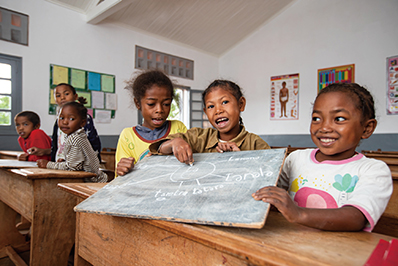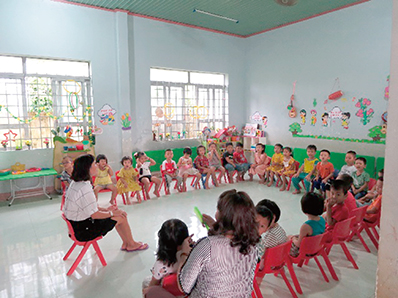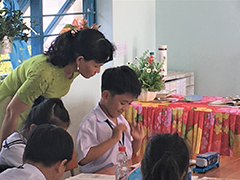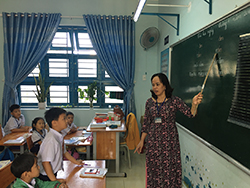(3) Quality Education for All
There are as many as approximately 58 million children who cannot go to elementary school worldwide. When including secondary school, it is estimated that there are approximately 256 million out-of-school children (16.8% of the total). Note 50 In particular, the percentage of children who cannot go to school has been increasing since 2000 in Sub-Saharan Africa. Moreover, many children have been impacted by school closures due to the spread of COVID-19. Above all, children with disabilities, children of minority ethnic groups or those in disadvantaged communities, refugee and displaced children, and those living in remote areas are at the greatest risk of being left behind, and there are further concerns surrounding the impact of school closures on malnutrition, early marriage, and gender inequality.
SDG 4 has been set up to “Ensure inclusive and equitable quality education and promote lifelong learning opportunities for all,” and the international community works on achieving the goal of “Education 2030 Framework for Action.”*
● Japan’s Efforts

Children learning to read and write through fun and play during the technical cooperation “School for All” project in Madagascar (Photo: JICA)
Japan provides developing countries with a broad range of support, including the enhancement of basic education, Note 51 higher education, and vocational training.
Based on the “G20 Initiative on Human Capital Investment for Sustainable Development: Quality Education to Create an Inclusive, Resilient, and Innovative Society” (G20 Osaka Summit 2019), Japan promoted its “Education x Innovation” initiative to support at least approximately nine million children and youths during the three-year period between 2019 and 2021. In order to allow all children to complete quality elementary and secondary education by 2030, it is essential to encourage innovation to accelerate assistance. Through this initiative, Japan will further strengthen support for education that fosters basic knowledge, STEM education, Note 52 development of e-learning, and more.
Also, Japan contributed a total of approximately $37.71 million from 2008 to 2021 to the Global Partnership for Education (GPE).* In partner countries of the GPE, the number of children supported by the fund since 2015 has amounted to approximately 32.7 million, and three out of four have finished elementary education. At the Global Education Summit held in July 2021, Japan pledged to contribute more than $1.5 billion over five years from 2021 to 2025 to support the fields of education, including continued support for the GPE, as well as for the education and human resources development of 7.5 million girls in developing countries.
At TICAD7 held in 2019, as initiatives for education and human resources development in Africa, Japan announced its intention to provide quality education to three million children through measures such as science and mathematics education and improvement of the learning environment, as well as develop 5,000 highly-skilled people for STI through assistance for the Egypt-Japan University of Science and Technology (E-JUST) Note 53 and Jomo Kenyatta University of Agriculture and Technology in Kenya. It was also announced that E-JUST would receive 150 African students, and 31 African students were newly admitted in 2020.
Moreover, with a focus on Niger and other West African countries, Japan has implemented the “School for All” project since 2004, which aims to build relationships of trust between schools, parents and guardians, and local residents, as well as improve the education environment for children. In cooperation with the World Bank, the GPE, and others, Japan spreads the project throughout the targeted African countries. 70,646 elementary schools in eight countries have introduced the program as of December 2021.
In addition, in Egypt, the introduction of Japanese-style education at local schools has been promoted since February 2017 under the Egypt-Japan Education Partnership (EJEP). 48 “Egypt-Japan Schools” were opened by October 2021. Furthermore, “Tokkatsu-plus” a model for Japanese-style education has been introduced, and primary and junior high students at above-mentioned schools are engaged in special activities, such as cleaning, chore duties, and class meetings, as the core for holistic education that aims to build harmonious character, including sensitivity and morality. Japan provides support for management needed to conduct such special activities as well as support to introduce learning through playing at kindergartens.
In the Asia-Pacific region, Japan provides support for organizing the Asia-Pacific Meeting on Education 2030 (APMED2030) annually through the contribution to a funds-in-trust within the United Nations Educational, Scientific and Cultural Organization (UNESCO). Japan also supports initiatives toward the achievement of SDG 4 including through the quality improvement of education, enrichment of early childhood education, spread of non-formal education, and increasing the teaching capacity of teachers. Moreover, Japan supports human resources development in developing countries by engaging in efforts to strengthen networking among higher education institutions between Japan and ASEAN, collaborating with the industrial sector, participating in joint research projects with neighboring countries, accepting international students to Japanese institutions of higher education and other institutions, and a wide range of other measures.
■ Promoting Education for Sustainable Development (ESD)

Children learning in an expanded classroom built through Grant Assistance for Grass-Roots Human Security Projects at a kindergarten in Dak Lak Province, Viet Nam
“Education for Sustainable Development*: Towards achieving the SDGs (ESD for 2030)” began in January 2020 with UNESCO as the leading organization. ESD is education to contribute to the realization of all SDGs by fostering the builders of a sustainable society, and as a proposing country of ESD, Japan continues to engage in the promotion of ESD as well as play a significant role in its global advocacy and enhancement through the funds-in-trust to UNESCO. In addition, through the funds-in-trust, Japan actively promotes ESD by implementing the “UNESCO-Japan Prize on Education for Sustainable Development” together with UNESCO, which awards organizations and groups that conduct excellent initiatives toward putting ESD into practice, and has been awarded to 18 organizations to date.
Viet Nam
Building System of Training Course of Inclusive Education for Primary School in Binh Thuan Province and An Giang Province (Phase 3)
Grant Assistance for Japanese NGO Projects (March 2019 – March 2020)
In Viet Nam, since there is only one special-needs school in each province,*1 and its capacity is limited, children with disabilities are unable to attend school in many cases. Some of those children attend public primary schools, and this is encouraged by the Government of Viet Nam. However, it turned out that teachers at these schools have a limited understanding of disabilities, resulting in confusion in the field of education. Therefore, through the scheme “Grant Assistance for Japanese NGO Projects,” NPO Asia Rainbow established a training system on inclusive education*2 for teachers at public primary schools in the two provinces of Binh Thuan and An Giang, located in southern Viet Nam, to enable children with disabilities to receive appropriate education.
In this project, Japanese experts carried out training for 60 key teachers*3 in Binh Thuan and An Giang provinces on inclusive education, including methods of creating individual education plans (IEPs)*4 and other areas. After that, the key teachers returned to their respective provinces to provide training for other teachers in each district, which enabled a framework for all teachers across the two provinces to receive training on inclusive education. The project also provided counselling to a total of 600 children with disabilities, their parents, and teachers and strived to understand the current situation accurately while undertaking these activities.
As a result, the primary school enrolment rate for children with disabilities rose from 38% to 87% in An Giang, and from 68% to 95% in Binh Thuan respectively after the implementation of the project. Responses have also been heard from the field of education such as “The instruction given by the teachers who received training has helped children with disabilities to learn in a more relaxed way than before. Previously, there were cases of repeating a grade, but now they have all managed to move up to the next grades.”
In this way, Japan contributes to providing educational opportunities to children with disabilities so that they can expand their future opportunities.

An inclusive class at a primary school in Binh Thuan (Photo: NPO Asia Rainbow)

A lesson by a teacher who has received training on inclusive education at a primary school in Binh Thuan Province (Photo: NPO Asia Rainbow)
*1 An administrative unit of Viet Nam, one level above a “district.”
*2 A system that respects human diversity and allows persons with and without disabilities to learn together.
*3 Instructors representing each province, selected by the Department of Education and Training (DOET) of each province of Viet Nam from among its primary school principals, vice principals, and DOET personnel.
*4 Education plans whose objective is to carefully grasp the needs of each child with a disability and respond appropriately from an educational perspective.
Glossary
- Education 2030 Framework for Action
- The Education 2030 Framework for Action succeeds the EFA Dakar Framework for Action aimed at achieving education for all, adopted at the World Education Forum in Dakar, Senegal in 2000. It was adopted at the Education 2030 High-Level Meeting, which was held to coincide with the UNESCO General Conference in 2015.
- Global Partnership for Education (GPE)
- GPE refers to an international partnership established under the leadership of the World Bank in 2002, which supports the education sector in developing countries. Its members include developing countries, donor countries and organizations, civil society, and private-sector corporations and foundations. It was renamed as GPE from Fast Track Initiative (FTI) in 2011.
- Education for Sustainable Development (ESD)
- ESD refers to education that fosters builders of sustainable societies. ESD was affirmed as being the key for achieving all the SDGs in the resolutions of the 72nd Session of the UN General Assembly in 2017. This was also reaffirmed in the “ESD for 2030,” which was adopted by a resolution of the 74th Session of the UN General Assembly in 2019. “ESD for 2030” is the program succeeding the United Nations Decade of Education for Sustainable Development (UNDESD) (2005-2014) and the Global Action Program (GAP) on ESD (2015-2019), and is a new international implementation framework from 2020 to 2030.
- Note 50: Pages 209, 413, and 427 of the “Global Education Monitoring Report 2021.”
https://unesdoc.unesco.org/ark:/48223/pf0000379875 - Note 51: The educational activities designed to enable individuals to acquire the knowledge, values, and skills necessary to live. It mainly refers to elementary education, lower secondary education (equivalent to Japanese junior high schools), pre-school education, and adult literacy education.
- Note 52: STEM is an acronym for science, technology, engineering, and mathematics, and refers to these four educational fields.
- Note 53: Established based on an agreement (bilateral agreement) between the Government of Japan and the Government of the Arab Republic of Egypt to establish the Egypt-Japan University of Science and Technology (2009). Based on the agreement, Japan supported the establishment of E-JUST and its operation as a university that provides graduate school, research-centered, pragmatic, and international-standard education for a small number of students, which is characteristic of Japanese-style engineering education. Japan is currently implementing technical support aimed at establishing E-JUST’s foundation as a top-level research university in Egypt in order for E-JUST to develop human resources in the field of industry and science and technology in the Middle East and Africa.
